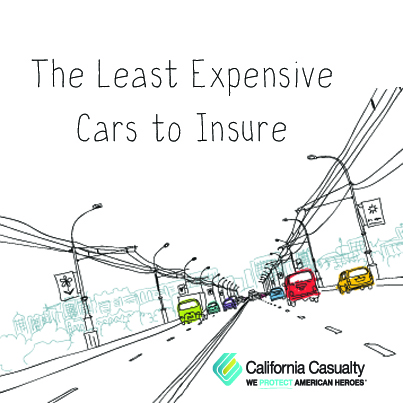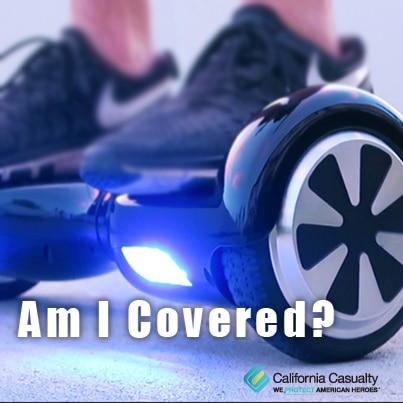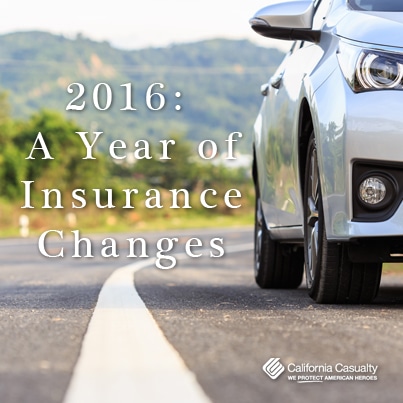by California Casualty | Auto Insurance Info |
Maybe it’s a dangerous airbag, or a leak that could cause a fire or an electrical system that could shut down your vehicle while you drive – odds are good you or someone you know is driving a car or truck that is the subject of a recall. The National Highway Traffic Safety Administration (NHTSA) is warning that 51 million vehicles had some sort of a recall in 2015. That follows the record 60 million recalls the year before. The scary part is that upwards of 25 percent of them never get fixed. That means millions of cars and trucks – maybe one driven by you or a loved one – are still on the road with a possible hazardous condition.

There are many reasons why drivers aren’t getting defective vehicles to a dealer or mechanic:
- They are not aware of the recall
- The time and cost involved
- They just don’t care
An industry analysis found that Fiat, Honda, Ford, Toyota and GM vehicles were involved in almost three-fourths of the recalls in 2015, with the biggest factor being the recall of Takata equipped airbags. However, others were for leaks that could start an engine fire, defects that could make the vehicle lose control while driving, or seats that could collapse in a crash.
Wouldn’t you like to know if a car or truck that your son or daughter was driving had a serious defect. NHTSA thinks it’s important and has launched a new “Safe Cars Save Lives” campaign urging everyone to check for recalls twice a year. They hope the effort will reduce the number of unsafe vehicles on the road and ultimately save lives.
The website to check if a vehicle you drive has a recall is
https://www.safercar.gov/CheckForRecalls.
If you find a vehicle on the list that someone in your family drives, you should immediately:
- Contact the dealer and make an appointment to have the defect repaired
- Seek reimbursement if it was already repaired before you were notified of the recall (within a year); the automaker is obligated to reimburse you for the repair if it was done at one of its franchised dealers
- Submit work orders and a receipt for reimbursement if you had the repair done by an independent mechanic
The bad news is if ten years has gone by since the original recall notice, you might be stuck paying for the repairs yourself.
The good news is that driving a recalled vehicle shouldn’t affect your insurance rates, but you will want to get it fixed as soon as possible to make sure your family and other drivers around you are safe.
Another way to protect your vehicle and your precious passengers is to get an auto insurance policy comparison or review. Just call a California Casualty advisor today to make sure you are adequately covered at 1.800.800.9410 or visit www.calcas.com.
Sources for this article:
https://www.safercar.gov/CheckForRecalls
https://www.edmunds.com/car-safety/recalled-but-unrepaired-cars-are-a-safety-risk-to-consumers.html
https://www.nhtsa.gov/About+NHTSA/Press+Releases/nhtsa-launches-safe-cars-save-lives-campaign-01212015
https://www.bloomberg.com/news/articles/2014-04-15/drivers-ignoring-recall-notices-pose-hurdle-for-gm-s-ceo
by California Casualty | Auto Insurance Info |

2015 was a banner year for automobile sales. When it was all said and done, 17.5 million cars and trucks went to our homes. Cheaper gasoline, low interest rates and big incentives helped eclipse the previous record set 15 years ago.
However, if you are in the market for a new vehicle, don’t forget to factor in the cost of insurance when you are researching what to buy. The excitement of that new vehicle can quickly fade when you find out the cost to insure it.
Insure.com did some number crunching to determine which new cars will save you money on auto insurance premiums. They created a mythical 40 year old male with a 12 mile commute, a good driving record and good credit, and then checked rates for over 1,500, 2015 vehicles.
They found the least expensive to insure was the Jeep Wrangler Sport 4WD, with an annual cost of $1,134. The Jeep Patriot 2WD was second at $1,136. Rounding out the top five were the Honda CR-V LX 4WD, Dodge Grand Caravan SE Plus and the Honda Odyssey LX, all under $1,200 per year (See the attached list).
Now keep in mind, the actual average per state premiums varied widely, with the driver of the Jeep Wrangler paying as little as $694 a year in Maine or as much as $2,012 in Hawaii.
The factors that determine the cost to insure a vehicle are a combination of its price, horsepower, and claims history. From an insurance perspective, the better value vehicles were those that retail for less, cost much less to repair and are less likely to be stolen or involved in a crash. It’s no surprise that the most expensive vehicles to insure typically sell for more than $100,000, reach speeds of 200 miles per hour and cost much more to repair.
No matter what new vehicle you choose, there are ways you can lower the insurance costs:
- Clean up your credit. Many insurance companies look at your credit score, the better your credit the better rate you are likely to receive.
- Increase your deductibles. The savings will add up, especially if you are incident free for a number of years. Just make sure you have an emergency fund to cover that higher deductible.
- Check for good driver/good student discounts. Speaking of incident free, when’s the last time you had an accident or a moving violation. Most insurance companies will give you a good driver discount, but make sure you tell them. The same goes for students with good grades.
- Cut your driving. Ride a bike, take mass transit or move closer to where you work. How many miles you drive each year can affect your auto insurance rates; the less you drive, the greater the possible discount.
- Get a policy review. Has your commute changed? Did you install a security device? Did you get married? All of these can lower the rate you pay for insurance. Talking with your insurance advisor at least once a year is the best way to make sure you get the discounts you’re entitled to.
- Compare your current insurance to California Casualty. We are a 100 year old, policyholder owned company that provides auto and home insurance to educators, law enforcement officers, firefighters and nurses with exclusive benefits not available to the general public. This means:
- Deductibles waived or reduced for vandalism or accidents that occur when your vehicle is parked at work
- $500 coverage for personal property that is damaged or lost in a collision, fire or taken from your car
- Rates guaranteed for a full year (not six months)
- Free identity theft protection comes with each policy
- Multiple payment options including EZ Pay and holiday or summer skips
- Superior customer service – 99 percent with a claims satisfaction rating of 96 percent, (source: https://www.calcas.com/customer-feedback)
If you’re in the market for a new car, truck or SUV, contact a California Casualty advisor today. You might be surprised at the savings and all the benefits you qualify for at 1.800.800.9410 or visit www.calcas.com.
Sources for this article:
https://www.insure.com/car-insurance/insurance-rates-by-car.html
This article is furnished by California Casualty, providing auto and home insurance to educators, law enforcement officers, firefighters and nurses. Get a quote at 1.800.800.9410 or www.calcas.com.
Ten Most and Least Expensive Cars to Insure (from Insure.com)
The least expensive 2015 cars to insure
| 1 |
Jeep Wrangler Sport 4WD |
$1,134 |
| 2 |
Jeep Patriot Sport 2WD |
$1,136 |
| 3 |
Honda CR-V LX 4WD |
$1,160 |
| 4 |
Dodge Grand Caravan SE Plus |
$1,162 |
| 5 |
Honda Odyssey LX |
$1,163 |
| 6 |
Jeep Compass Sport 2WD |
$1,164 |
| 7 |
Subaru Outback 2.5i |
$1,176 |
| 8 |
Ford Edge SE 2WD |
$1,176 |
| 9 |
Smart ForTwo Pure |
$1,186 |
| 10 |
Ford Escape S 2WD |
$1,190 |
The most expensive 2015 cars to insure
| 1 |
Nissan GT-R Nismo |
$3,574 |
| 2 |
Mercedes-Benz SL65 AMG Convertible |
$3,573 |
| 3 |
Dodge SRT Viper |
$3,318 |
| 4 |
Porsche 911 Carrera S Cabriolet |
$3,216 |
| 5 |
Audi R8 5.2 Spyder Quattro |
$3,206 |
| 6 |
Porsche Panamera Turbo Executive |
$3,174 |
| 7 |
BMW 760Li |
$3,147 |
| 8 |
BMW M6 Convertible |
$3,115 |
| 9 |
Mercedes-Benz E63 AMG 4Matic Wagon |
$3,042 |
| 10 |
Mercedes-Benz CLS63 AMG 4Matic Sedan |
$2,972 |
by California Casualty | Auto Insurance Info, Homeowners Insurance Info |

It seems as if almost every household has gotten a hoverboard; they are one of the hottest gifts of the New Year. Hoverboards are similar to skateboards but they have a motor and can move along at speeds around 10 miles per hour. If you were one of the many hundreds-of-thousands who purchased one of the new high-tech gadgets, be aware that they also have a dangerous side.
The U.S. Consumer Product Safety Commission (CPSC) is warning that many of the self-balancing scooters have burst into flames due to faulty batteries. People and property have been burned and airlines and many college campuses are now banning them because of the fire risk.
The other hazard is from falls. How is your balance? If it’s not very good, stay off a hoverboard. Scores of users have suffered scrapes, bruises and even broken bones after being tossed off the motorized devices. There are a multitude of videos and news sites highlighting “hoverboard fails.” Some of the injuries have been very serious.
So before you get on a hover board, make sure you have a proper helmet, protective padding and wrist and elbow guards. The CPSC also advises to:
- Avoid buying them at locations like a mall kiosk or website that doesn’t have information about who is selling the product and how they can be contacted if there is a problem
- Be very careful when charging the board – don’t overcharge it, don’t leave it plugged in overnight, always observe it while charging, and keep it away from flammable items
- Let it cool after riding before recharging it
- Leave it in its partially charged state if giving one as a gift – never take it out of the package to bring it to a full charge and rewrap it
- Don’t ride in heavy traffic or pedestrian areas
- See if it has the mark of a certified national testing lab (like UL)
There is another major issue concerning hoverboards – insurance and liability risks. Since they are a motorized device, you may not be covered if you hurt somebody while riding one. If you hit a crack, crash into a person and cause them injury, coverage under your homeowners liability might be excluded. Also, if you loan your hoverboard to someone who subsequently falls and gets injured, you might be on the hook for any hospital or medical bills.
Now, if your hoverboard starts a fire and causes damage to your home or apartment, and you have homeowners or renters insurance, you might be covered for the cost of repairs. Those policies provide protection from accidental fires, but every company and contract is different.
So, the moral of the story is that you should be very careful if you have a hoverboard. You’ll want to read all the safety information that should have come with the device, and be vigilant when charging it. You also need to contact your insurance company to learn about your coverages and how you might be impacted if there were an accident with your hoverboard.
If you don’t have homeowners or renters insurance, now is the time to get it. One of California Casualty’s exceptional advisors is ready to help; call today at 1.800.800.9410 or visit www.calcas.com for a policy comparison or review.
Resources for this article:
https://abcnews.go.com/Health/wireStory/colleges-students-leave-hoverboards-home-36136212
https://www.cpsc.gov/en/About-CPSC/Chairman/Kaye-Biography/Chairman-Kayes-Statements/Statements/Statement-from-the-US-CPSC-Chairman-Elliot-F-Kaye-on-the-safety-of-hoverboards/
https://www.buzzfeed.com/daves4/hoverboard-rip#.jeP4Wpd8Dy
https://www.osha.gov/dts/otpca/nrtl/nrtllist.html
by California Casualty | Auto Insurance Info, Homeowners Insurance Info |

What can we expect in the New Year? There will be a new president of the United States, many are predicting another see-saw year for the stock market and Forbes predicts the Olympic Games in Brazil will turn out to be the most poorly run in history.
What can you expect when it comes to insurance? Here are the thoughts of one prognosticator:
- Millennials will have a bigger impact – now in their mid-30s, this has become the generation replacing the aging baby boomers with influence and dollars. Insurance companies will have to continue to adapt to serving them online and offer more services accessible from mobile devices.
- Bigger rewards for consumers who adapt to the Internet of Things (Io T) – whether it be devices that monitor how you drive or emerging technologies for the home, insurance companies will continue to use data from intelligent devices to predict losses and reward those who install them. They include water or leak detection systems, interactive door locks, and appliances that can communicate and be controlled via a smart phone or other mobile device.
- Renters insurance will spike – with the increasing trend of more millennials opting to rent than buy homes, the renters insurance market will continue to boom.
- More peer-to-peer insurance – there will be more specialized insurance dedicated to targeted groups of policyholders. The concept is a return to the earliest forms of insurance that pooled together like-minded groups like farmers. Peer-to-peer insurance provides quality protection at reasonable rates.
As we face a New Year with excitement and uncertainty, it’s good to know there is a company you can depend on for your auto and home insurance needs. California Casualty is a 100 year old company founded as, and continues to be, a policyholder owned company that serves specialty groups: law enforcement, firefighters, educators and nurses with exclusive benefits not available to the general public. They have partnered with us because of our competitive rates and insurance that reflects their members’ professional lifestyles. This means:
- Deductibles waived or reduced for vandalism or accidents that occur where your vehicle is parked at work
- Personal property damaged or lost in a collision, fire or taken from your car is covered up to $500
- Rates guaranteed for a full year (not six months)
- Free identity theft protection with each policy
- Multiple payment options including EZ Pay and holiday or summer skips
Are you using all of your professional benefits? Now is the time for a policy review to see if you could be saving money or getting better coverage for your auto or home. Call one of our award winning advisors today at 1.800.800.9410 or visit www.calcas.com.
Resources for this article:
https://beta.propertycasualty360.com/2015/12/29/technology-and-insurance-predictions-for-2016
by California Casualty | Auto Insurance Info, Homeowners Insurance Info |

As we drop the confetti and toast the New Year, an annual tradition is to make a resolution. What will yours be? Here are the top five resolutions Americans have made in recent years:
- Lose weight
- Get organized
- Spend less and save more
- Enjoy life
- Become more fit and healthy
Unfortunately, research shows less than 10 percent of those of us who make resolutions actually keep them.
But, there are easy actions you can take that could save you money and provide peace of mind.
Every year, many Americans fail to take stock of their biggest assets: their homes and vehicles. Here is a list of 11 simple resolutions you can make this New Year to protect the most valuable possessions you have worked so hard to attain.
7 Home Insurance Resolutions:
- Do a yearly policy review with an insurance advisor to check that you are getting all the discounts you qualify for, that you adequately insure any new additions or appliances, and verify that your liability coverage isn’t lacking
- Make sure you have replacement value if a fire or other disaster strikes
- Purchase earthquake or flood insurance if you live in areas prone to either
- Save on your premiums by investing in security and fire suppression systems
- Get renters insurance if you don’t have it yet
- Protect high-dollar items such as jewelry, fine art or musical instruments with scheduled personal property insurance
- Complete a comprehensive inventory of everything in your home in case you should ever have a claim
4 Auto Insurance Resolutions:
- Get a yearly policy review to check deductibles, coverages and to make sure you are getting all the discounts you qualify for (professional, multi-policy, good student, mature driver)
- Make certain you have adequate protection from uninsured or under-insured drivers
- Add any new drivers to your policy (teens or a new spouse)
- Bundle your auto and home insurance to receive deeper discounts
We Are Here To Help
Start the New Year off right; resolve to call today to make sure you are getting the professional discounts you deserve: $500 coverage for items destroyed or stolen from your vehicle, deductible waived or reduced if your vehicle is vandalized or hit while parked where you work, and special coverages for the equipment used for your job.
California Casualty advisors are ready to help you with any questions, do a policy comparison or review, or make any insurance changes you may need at 1.800.800.9410, or go online at www.calcas.com.
Resources for this article:
https://www.statisticbrain.com/new-years-resolution-statistics/
https://www.insurancejournal.com/news/national/2014/08/12/337407.htm
https://www.knowyourstuff.org/iii/login.html
by California Casualty | Auto Insurance Info |
As Americans hit the roads for driving season, your vacation trip can be less expensive if you maintain your vehicle for the best gas mileage. Here are six tips from Carcare.org on increasing the miles you get from each gallon of fuel:
- Tune up – properly tuned vehicles can improve gas mileage by an average of 4 percent
- Tire Pressure – proper inflation can net a 3 percent gas mileage improvement
- Motor Oil – get a 1 or 2 percent increase in mileage by using the grade of motor oil recommended by the manufacturer
- Air Filters – replacing clogged filters adds mileage and improves auto performance
- Gas Cap – damaged or missing caps allow fuel to vaporize
- Fix It – getting a serious maintenance problem like a faulty oxygen sensor fixed can improve mileage by as much as 40 percent
The U.S. Department of Energy also has an entire webpage filled with tips on driving more economically:
- Cutting aggressive driving and fast starts can increase mileage by up to 33 percent
- Hauling cargo in the trunk or in rear-mount cargo boxes instead of on a roof rack can increase mileage by up to 17 percent
- Removing excess weight increases gas mileage
- Avoiding excessive idling can save a quarter to a half gallon of gas per hour
- Use cruise control
- Going over 50 mph decreases your gas mileage
The Energy Department website also has a feature that can help you find the most fuel efficient vehicles to buy.
To get the most mileage from your auto insurance, call a California Casualty advisor for a free policy review, 1.800.800.9410 or visit www.calcas.com.
Resources for this article:
https://carecare.org
https://www.fueleconomy.gov/





